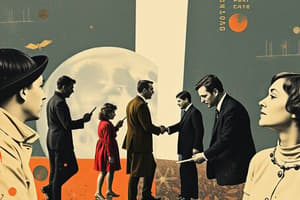Podcast
Questions and Answers
What is Social Facilitation?
What is Social Facilitation?
- Enhancement of group inclinations
- Social loafing in groups
- Stronger responses on simple tasks with others present (correct)
- Weaker responses when alone
Give an example of Social Facilitation.
Give an example of Social Facilitation.
Athletes perform better when observed.
The Hawthorne Effect is another name for Social Facilitation.
The Hawthorne Effect is another name for Social Facilitation.
True (A)
What does Social Loafing refer to?
What does Social Loafing refer to?
Why does Social Loafing occur?
Why does Social Loafing occur?
Social Loafing is more common in ______.
Social Loafing is more common in ______.
What is Deindividuation?
What is Deindividuation?
What is Group Polarization?
What is Group Polarization?
What results from Groupthink?
What results from Groupthink?
Culture is also known as ______.
Culture is also known as ______.
Match the terms with their definitions:
Match the terms with their definitions:
There are no truths to stereotypes.
There are no truths to stereotypes.
What is the difference between Social Control and Personal Control?
What is the difference between Social Control and Personal Control?
Flashcards are hidden until you start studying
Study Notes
Social Facilitation and Related Concepts
- Social Facilitation: Performance on simple or well-learned tasks improves in the presence of others.
- Example: Athletes often perform better when being observed compared to when alone.
- Alternate Name: Also referred to as the Hawthorne Effect or Observer Effect, indicating that awareness of observation influences behavior.
- Hawthorne Effect: Individuals modify behavior due to the awareness of being watched.
Group Dynamics
- Social Loafing: Tendency to exert less effort in a group compared to when working alone, often due to reduced accountability.
- Reason for Social Loafing: Individuals may view their contributions as less critical and thus may slack off unless highly motivated.
- Cultural Differences: More common in non-Western cultures, which typically emphasize collectivism compared to the individualistic nature of Western cultures.
Psychological Phenomena in Groups
- Deindividuation: Loss of self-awareness and self-restraint in groups, heightened by anonymity and group arousal.
- Example of Deindividuation: KKK members demonstrated increased aggression when masked, delivering more shocks to victims.
- Group Polarization: Discussion within a group can strengthen the group's prevailing attitudes.
- Groupthink: A mode of thinking in cohesive groups where dissenting opinions are suppressed in favor of harmony, often leading to poor decisions.
Cultural Influences
- Culture: Consists of behaviors, ideas, values, and traditions shared over generations within a group.
- Also Known As: Social norms that guide behavior within societies.
- Personal Space: Refers to the buffer zone maintained around individuals, varies by culture (e.g., handshakes vs. kisses in greetings).
- Cultural Perceptions: Different cultures perceive traits differently; e.g., Mediterranean cultures seen as warm yet inefficient, while Northern Europeans viewed as cold but efficient.
Individual Influence on Society
- Power of Individuals: Highlights the contrast between social control, influenced by situation, and personal control, driven by individual actions.
- Historical Examples: Individuals like Rosa Parks have shown how personal agency can influence societal change.
Understanding Prejudice and Discrimination
- Prejudice: Pre-judgment involving negative beliefs or attitudes towards a group.
- Discrimination: Actions that exhibit negative behavior towards individuals based on prejudiced views.
- Stereotypes: Oversimplified beliefs about a group; may contain some truth yet often based on ignorance.
- Schema: Cognitive framework that organizes and interprets information, accommodating new experiences by adjusting existing frameworks.
- Cognitive Dissonance: Occurs when individuals face contradictions between their stereotypes and real-life experiences.
Modern Prejudices and Social Issues
- Examples of Modern Prejudice: Includes profiling, sexism, and discrimination based on sexual preferences.
- Victim-Blaming: Individuals who face discrimination may experience self-blame or anger as a byproduct of victimization.
Studying That Suits You
Use AI to generate personalized quizzes and flashcards to suit your learning preferences.




